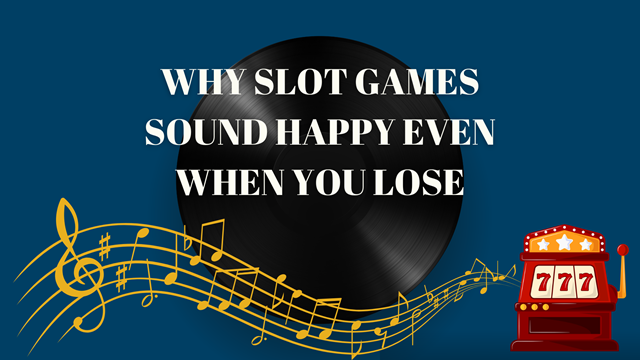
Slots are the most popular content in casino libraries. Players love them for simplicity and variety. Bright flashing lights and the diversity of themes drive user excitement, and software developers skilfully use psychological tricks to keep users engaged. Not many people notice the sounds surrounding wins and losses in gambling titles, but they play a critical role in their experiences. Here’s one paradox: even when players lose, they often hear a triumphant winning sound. Is it a provider’s mistake or an efficient strategy? Let’s sort everything out here!
The Role of Sound in Casino Slot Games
Multiple factors affect players’ perception of gambling, influencing their desires and actions. Sound is critical here: it often goes as a background, but still impacts the overall experience. Jingling bells, falling coins, and triumphant tunes trigger emotional responses in the human brain, and game developers actively use them to manage user behaviours. The leading non-GamStop sites use musical accompaniment to boost excitement and encourage members to extend their gambling sessions.
It’s pretty evident that a win in a slot machine is complemented by appropriate sounds, but what about losses? iGaming companies and content developers use cheerful tones during near-missed and unsuccessful outcomes to reduce negative emotions and maintain players’ engagement regardless of the spin result.
The Psychology Behind Happy Sounds
Reinforcement is among the main factors driving excitement in online gambling. Players tend to build associations, and happy sounds often reflect winning conditions. When users hear the coins falling or rewarding music for hitting the jackpot, their brain releases dopamine. This reaction is similar to how listeners respond to the latest electro-pop tracks, where upbeat melodies trigger emotional responses tied to familiarity and pleasure. Over time, the hormone responds to the familiar sound, regardless of whether the person wins or loses. This action motivates players to make more spins and win back during the following rounds.
Optimism Surrounding Near-Misses
A situation where the reels stop close to a winning combination is common in slot machines, and it’s not an occasional mistake. Developers integrate this option to boost excitement and activate the FOMO effect. Players are confident that the coveted successful outcome is close and continue spinning the reel. Near-misses are often complemented by celebratory sounds that the human brain considers a win. Selecting the right tone helps casinos maintain user loyalty and be confident that they will make another spin.
Minimising Frustration After Losses
Players perceive unsuccessful results differently: some remain calm and quit the casino until the following gambling session, and others experience anxiety and frustration. From their side, service providers aim to give hope to players and help them feel entertained. Positive sounds soften the bitterness of losses. The illusion of control is another trick that iGaming companies use. A winning combination that is really close and corresponding happy music makes adrenaline hunters feel that a successful outcome is right around the corner. This psychological approach is often present in casinos ohne OASIS, where fewer restrictions allow for more immersive and emotionally charged gaming experiences.
Maintaining Longer Gambling Sessions and Long-Term Loyalty
If users had constantly heard unhappy sounds when playing slot machines, they wouldn’t be so attracted to this game type. Music triggers multiple emotions, and a rewarding sound is often more valuable than the winning itself. Intermittent reinforcement is a psychological phenomenon that is applicable in this case. Its essence lies in providing regular incentives and tracking customers’ reactions to develop a predictable behaviour. It’s exactly what’s used in slot machines that have happy sounds, no matter what the spin result is.
LDWs (Losses Disguised as Wins) are also common in online casinos. These sound-based tactics are often embedded in exciting online casino games to influence user perception and prolong playtime. It often happens that players win less than they initially staked, but the game still rewards them with victorious sounds. Gamblers still lose money, but their brain perceives happy tones and animations as a successful outcome. Game designers understand the power of sound effects on people’s actions and intentionally create slots for positive emotional experiences.
The Ethical Side
Happy sounds keep players engaged in slot machines, but what about the ethical considerations on this point? Gambling addiction is a significant challenge in the 2020s, and many are concerned about online casinos using addictive psychological tricks. With happy soundtracks, operators mask actual people’s losses and encourage longer sessions, which can eventually result in compulsive disorders.
Responsible gambling advocates highlight the need to eliminate this feature, providing players with the right to decide how long to play without third-party intervention. Some regulatory authorities are already working on changing the legal basis and implementing new requirements for game developers. For instance, the UKGC has already released an update, prohibiting fast-paced games that often encourage extended sessions and result in the loss of control. This move aligns with broader efforts to prioritise player protection and reduce reliance on features that exploit behavioural psychology.
Final Insight
Sound is a powerful tool for influencing people’s emotions and decisions, so it’s not surprising that slot machines integrate a variety of tunes to boost the thrill. Some users have noticed that losses are still accompanied by celebratory music, which is not an occasional occurrence. Game designers aim to soften the disappointment of unsuccessful experiences, encouraging players to remain active in an online casino. Responsible gambling must remain the top priority here: iGaming companies use varied strategies for user engagement, but should promote a safer approach to this pastime.





